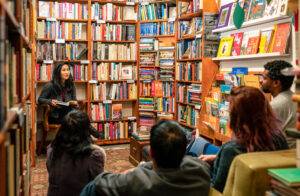Written by Scott Wilson

It’s not a stretch to suggest that the most powerful works of literature are the most personal.
- Sylvia Plath’s The Bell Jar mirrored much of her early life and showed the inside of her struggles with depression, discrimination, and abuse. Plath ended her own life only a month after the novel was published.
- Emily Brontë’s Wuthering Heights sprang from vivid passions and a strength of character trapped in a society that allowed little expression from women.
- Oscar Wilde’s The Picture of Dorian Grey was an outgrowth of Wilde’s repression as a homosexual and his intense interest in identity and perceptions of morality.
These and other famous literary fiction novels are some of the most widely read works in the English language. The classics that kids read in school today are drawn from this most hallowed genre of written fiction.
When people talk about literature, literary fiction is usually what they are talking about.
If you are spurred by similar passions and have deeply-felt truths to communicate or issues to explore, then writing literary fiction may be for you. But not everyone has the innate ability of the Brontë sisters or the publishing connections of Wilde.
To better understand the revered field of literary fiction and to explore the techniques and standards of the genre, a creative writing degree is increasingly becoming the choice of serious writers.
What Is Literary Fiction?
A writer’s life and work are not a gift to mankind; they are its necessity.
~ Toni Morrison
Literary fiction is also sometimes called non-genre fiction, which tells you a lot about the kinds of works that end up there. If what you plan to write is so character-driven, stylistically distinctive, or cross-genre that it will give reviewers sleepless nights attempting to categorize it, it’s probably literary fiction.
Literary fiction is often seen as serious fiction. Many of the classic works in the genre have a hefty weight:
- The Great Gatsby by F. Scott Fitzgerald
- The Catcher in the Rye by J.D. Salinger
- Crime and Punishment by Fyodor Dostoevsky
- Anna Karenina by Leo Tolstoy
But it’s less that literary fiction has to be about serious subjects and more that the style, pacing, and creative expectations for literary fiction allow authors to sink their teeth into topics that other genres can’t quite come to grips with.
Some people distinguish literary fiction from other kinds by referring to them as genre fiction, or popular fiction. The idea is that literary fiction is not necessarily written to sell broadly or to fit conventional formulas.
Literary fiction frequently breaks the boundaries of other established genres of fiction. Infinite Jest by David Foster Wallace is one of the best-known and best-selling works of literary fiction in recent history, yet it is written with humor and contains elements of science fiction.
 Works of literary fiction tend to be lengthy. Some novellas fit the category but typical works of literary fiction are novels. This fits with the character-driven nature of the genre, which requires time to unfold deeper explorations of complex topics and emotions.
Works of literary fiction tend to be lengthy. Some novellas fit the category but typical works of literary fiction are novels. This fits with the character-driven nature of the genre, which requires time to unfold deeper explorations of complex topics and emotions.
Standards are also high in the world of literary fiction. Prospective lit fic authors need to really know their stuff. Whether it’s classical references or understanding techniques for character-building, works of literary fiction have to get it right on the first try. The competition is stiff.
Why Many Creative Writers Hope for a Career in Literary Fiction
The freedom of expression and the open nature of literary fiction is something that draws many writers to it. There are no constraints or limitations on the stories you can tell in the genre.
Literary fiction is a realm open to pure creativity.
Literary fiction is an exciting genre for creative writers to explore. Inventing new ways to tell timeless stories that touch readers is a part of the appeal. Many of the innovations found in the history of creative writing have come through works of literary fiction:
- Stream of consciousness narration, as in Faulkner’s The Sound and the Fury
- Flash-fowards, as with Scrooge’s visit from the ghost of Christmas Yet to Come in Dickens’ A Christmas Carol
- Framing devices, like those found in Arabian Nights and Chaucer’s The Canterbury Tales
- The unreliable narrator, as found in Poe’s The Tell-Tale Heart or Defoe’s Moll Flanders
In fact, it’s often works of literary fiction that create and set the standards for entirely new genres of writing. Shelley’s Frankenstein created horror writing; Samuel Richardson’s Pamela invented the romance novel.
It’s also one of the most personally expressive kinds of writing. If you’re utterly absorbed in the themes and stories running through your head, a work of literary fiction is one of the best places you will find to develop them.
Making a Living as a Literary Fiction Writer
 Literary fiction is maybe the purest form of writing, art for art’s sake. Literary fiction writers are masters of the craft, respected by their peers and readers alike.
Literary fiction is maybe the purest form of writing, art for art’s sake. Literary fiction writers are masters of the craft, respected by their peers and readers alike.
They are also among the writers who are least likely to make a living by writing.
Markets for literary fiction stories are not large and tend to not pay as well as genre fiction or non-fiction. Combined with the kind of time and intensive focus that developing a worthy piece of lit fic takes, that makes paychecks small and far between.
This is an obstacle that serious literary fiction authors have to deal with. A day job is a practical requirement for most. But creative writing degree programs offer new ideas and credentials that can put you into a job that is at least writing-adjacent, whether in teaching, editing, or publishing.
What Does It Take To Become a Literary Fiction Writer?
People from all walks of life have made it into the ranks of celebrated literary fiction authors. That means you, too, can get there. It doesn’t mean it’s easy.
Although literary fiction is not written for the mass market, that doesn’t mean it doesn’t have an audience to impress. Critics, scholars, and other writers are all likely readers of a work of literary fiction. And that means only the most skilled writers and the most polished works break the surface of the literary fiction world.
Don’t Try… Sometimes the Most Moving Fiction is Born of Failure
 Having an FBI file is a mark of some distinction in the world of literary fiction, so it’s remarkable that Charles Bukowski managed to get investigated by the agency more than once over the course of his writing career.
Having an FBI file is a mark of some distinction in the world of literary fiction, so it’s remarkable that Charles Bukowski managed to get investigated by the agency more than once over the course of his writing career.
In the first instance, it was on suspicion of evading the draft during World War II, but he was quickly found psychologically unfit for service and exempted.
After finding only limited success getting his stories published, Bukowski gave up writing for almost a decade. Spending time working in a pickle factory, delivering the mail, and doing a lot of drinking, Bukowski eventually returned to writing.
Finding more success on his second round, Bukowski left behind a series of critically acclaimed novels and poetry collections. On his gravestone is emblazoned his famous advice to aspiring writers: “Don’t Try.”
What kind of qualities do you need to become a successful writer of literary fiction?
A Deep Background in Literature and Storytelling
Literary fiction is a place for innovation and breaking new ground in narrative and story-telling. But it’s hard to know if you are actually breaking new ground without a strong familiarity with the history and conventions of the literature.
Strong Writing Skills and Technical Knowledge
To a lay reader, literary fiction may come across as either pretentious or nonsensical. But a work such as Ulysses or Gravity’s Rainbow is revealed as a product of careful calculation and heart-rending effort through the technical skills of writers like Joyce and Pynchon.
Both James Joyce and Thomas Pynchon, both groundbreaking literary fiction writers, received an extensive university education in English and the classics with degrees from highly respected colleges.
Discipline and Commitment
Literary fiction also requires enormous commitment and effort. Breaking new ground in fiction doesn’t come quickly or easily. Wallace spent a decade writing Infinite Jest… as did Margaret Mitchell with Gone With The Wind. Literary fiction writers have to be prepared to go down long, blind alleys, to hit dead-ends and restart from scratch, and to persevere through all types of narrative and practical obstacles to see their vision made real.
A Clear Vision
That vision itself may be the most critical part of a literary fiction writer’s tools. There are no formulas to follow and no patterns to retreat to in this genre. Your original vision and concept have to be the solid ground you stand on through storms of doubt and dismay.
And by the way, everything in life is writable about if you have the outgoing guts to do it, and the imagination to improvise. The worst enemy to creativity is self-doubt.
~ Sylvia Plath
How Online Creative Writing Degrees Help You Build Masterpieces of Literary Fiction
It shouldn’t be any surprise that creative writing degrees build each of those skills and qualities in their graduates: they were designed to do exactly that. And the success of Wallace, of Michael Chabon, of Alice Sebold and of many other modern literary fiction masters, is the proof that they succeed.
Copious Reading Assignments Build Your Background in Literature
A great novel, rather than discouraging me, simply makes me want to write.
~ Madeleine L’Engle
Creative writing degrees make sure you get all the education in both modern and classical works of literary fiction to know what has come before and what is genuinely innovative. The scope of works assigned to students in creative writing programs is both wide and deep. You’ll be exposed to great works as well as obscure. And you’ll learn how to tie them together thematically to understand the larger tropes and techniques used to create them.
Constant Writing Work Hones Your Technical Skills
When you are not busy with reading in creative writing programs, you are writing. A thousand or more solid words per week is not unusual… about what a professional novelist might do in a day, but still a formidable goal for someone still learning the trade. The very process of writing forces development of your writing skills.
Review and Feedback Develops Both Discipline and Skill
It’s not writing alone that builds your technical craft. Constant and regular feedback from instructors nails down your expertise in everything from vocabulary to plot development. It also cultivates the kind of discipline you will need to see through a complex work of literature to the bitter end. Faculty help both correct you when you are off-course and in delivering you when you become stuck.
Workshops and Contemplation Help Realize Your Vision
 In addition to the feedback you will receive from instructors, creative writing degrees are famous for the involvement of fellow students. You’ll spend valuable time kicking around ideas and manuscripts with one another, hearing how your thoughts resonate. Most programs also offer time and space for developing your ideas, through residencies that help reset your frame of mind and put you in the right environment for creativity.
In addition to the feedback you will receive from instructors, creative writing degrees are famous for the involvement of fellow students. You’ll spend valuable time kicking around ideas and manuscripts with one another, hearing how your thoughts resonate. Most programs also offer time and space for developing your ideas, through residencies that help reset your frame of mind and put you in the right environment for creativity.
Professional Exposure and Networking Come Through Creative Writing Degrees
Creative writing programs also bring in the big guns: famous authors who know all about literary fiction because they have helped to define it. You’ll often have the opportunity to discuss deep matters of literary interest with the foremost thinkers in the field. In some cases, visiting literary fiction writers even work as instructors in creative writing degrees.
It’s hard to imagine better training to become a writer of literary fiction than to have George Saunders or Lorrie Moore as a creative writing professor.
This also touches on another key benefit to a formal creative writing program: networking. In the world of literary fiction, it can be hard to stand out. While the quality of your writing isn’t improved simply by rubbing shoulders with luminaries in the field, your ability to get it in front of people who matter is. To land a publishing deal right out of a degree program, as Elizabeth Kostova did with The Historian, you need both talent and connections.
While literary fiction writers aren’t absorbed with publication in the way that pop fictions writers may be, becoming part of the writing community also helps develop an understanding of the publishing business. Surrounded by other students and professors who have been or seek to be published, you’ll get a lot of inside information on finding agents, submitting manuscripts, and negotiating contracts.
How Online Creative Writing Programs Allow Anyone a Path To Becoming a Literary Fiction Writer
 Becoming a writer of literary fiction can be a long process. It’s very common, like Toni Morrison or Henry Miller, to not have a successful literary novel published until you are in your 40s. Some writers won’t even feel that motivation until they are already well on their way to success in another career, with families and professional and personal obligations already established.
Becoming a writer of literary fiction can be a long process. It’s very common, like Toni Morrison or Henry Miller, to not have a successful literary novel published until you are in your 40s. Some writers won’t even feel that motivation until they are already well on their way to success in another career, with families and professional and personal obligations already established.
This makes online creative writing programs particularly valuable. With the same kind of professional education and interaction as traditional programs, but more flexible attendance requirements, an online creative writing degree is more accessible to aspiring lit fic writers from all walks of life.
It’s a kind of program that is uniquely suited to the online format. Writing is a solitary affair, particularly literary fiction. Online meetings allow you the peace and solitude to create in the environment you prefer, and then gather virtually with professors and classmates to review the work. Many writers prefer exchanges in text to in-person gatherings anyway, and online discussion boards and email exchanges are the perfect format for exchanging stories and offering commentary.
These low-residency programs do include gatherings with peers and instructors, however. The once-per-semester or per-year meetings may be on-campus or in more tranquil places, and allow more feedback and creativity to flow on top of the exchanges already built.
What Level of Creative Writing Degree Do You Need To Succeed in Literary Fiction?
Creative writing is taught at every level of college today:
- Certificate programs take weeks or months to dive into specific types of writing without lengthy credit requirements.
- Associate degrees are two-year programs that combine a basic introduction to creative writing with essential general education courses.
- Bachelor’s degrees are four-year programs that offer extensive writing practice and additional specialization options combined with traditional liberal arts training.
- Master’s degrees in creative writing are two-to-three year degrees that are considered the pinnacle of training, focusing exclusively on advanced topics in writing and offering extensive practice and discussion.
- Doctoral degrees in creative writing are mostly aimed at students going on to become professional educators in the field.
 In terms of cost, time commitment, and focus, each of these options has appeal to aspiring literary fiction writers in different stages of their own lives or careers. A certificate might be just the thing for a professional writer looking to jump into creative writing; a bachelor’s is the easy choice for a high school graduate with a burning desire to create and the time to pursue it.
In terms of cost, time commitment, and focus, each of these options has appeal to aspiring literary fiction writers in different stages of their own lives or careers. A certificate might be just the thing for a professional writer looking to jump into creative writing; a bachelor’s is the easy choice for a high school graduate with a burning desire to create and the time to pursue it.
In all cases, the MFA (Master of Fine Arts) in Creative Writing is considered the peak of creative writing education, however. Many of the most famous current crop of literary fiction authors have come through MFA programs. The prestigious nature of the MFA and the small program sizes make them a sure way to get the kind of personal attention and focused education needed to spark the most creative works of literary fiction.
All in all, every creative writing degree program is designed to turn students into authors. They provide the kind of support, education, and resources that writers need to turn their inspiration into polished, meaningful, readable works of literary fiction.




